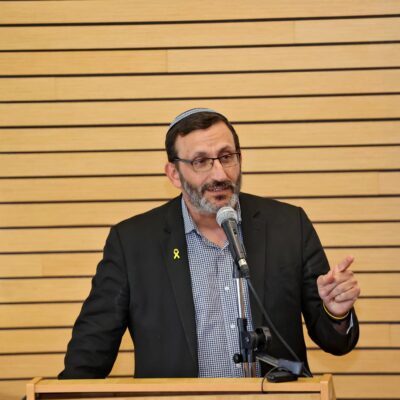STIMULATING GROWTH
Taking a page from VCs’ playbook, Tzalir Fund offers ‘seed funding’ to nonprofits looking to grow
Through the initiative, the fund will give grants worth $14,000 to some 15 organizations with the expectation that they will invest in it fundraising to get 10 times as much from new donors

Getty Images
Zilit and Meir Jakobsohn, owners of Medison Pharma and founders of the Tzalir Fund, launched a “command center” immediately after the Oct. 7 terror attacks, using their logistics and procurement contacts to distribute over 300 tons of humanitarian aid to Israelis in need.
One of the largest such operations in the country at its peak, that initiative now winding down. But during its run, the Jakobsohns said they gained valuable insight into social entrepreneurship. Also through their Banu LaTzafon project (“We came to the north”) for the rehabilitation of the northern city of Kiryat Shmona and its surrounding areas — one of the hardest hit areas by Hezbollah attacks — they saw many aid groups working tirelessly but lacking the seed funding that they needed for long-term fundraising strategies.
This led the Tzalir Fund to launch its “10X” philanthropic initiative last month to support war-affected communities, in partnership with JGive, Israel’s largest crowdfunding platform.
“We saw people with a great idea and a great business proof of concept who just needed to raise funds in order to get up off the ground. Like in real life, sometimes unfortunately, the rich get richer and the poor get poorer,” Nachman Rosenberg, director of the Tzalir Fund, told eJewishPhilanthropy. “That’s the same in philanthropy as well as in social impact. The big organizations that have money to invest in fundraising and in marketing, they’re always going to be raising more money. If you don’t have the money to launch a campaign you just can’t get out of the hole. We saw many awesome initiatives that we thought could use some seed funding to really help them build a stronger network of funders.”
Now six months in the planning, the grant-giving model — similar to VC-style funding for new high-tech firms — will be like “startup grants” for philanthropy, said Rosenberg. Approximately 15 grants of NIS 50,000 ($14,000) will be awarded this year to help nonprofits dedicated to rehabilitation efforts build sustainable fundraising strategies. With over 100 applications, the selection process begins Feb. 1.
“This is an area for which there is tremendous need. What we’re hoping is that through this process it will create a kind of trifecta effect with the power of numbers that…if we focus in one area for a start, hopefully it can bolster even greater results in that area,” said Rosenberg.
The funding is designed to help impact organizations raise NIS 500,000 ($140,000) from new donors — hence the 10X name — through sustainable long-term financial infrastructure. The grants will be given to five organizations in the first round, said Rosenberg. Money for the grants has already been earmarked from existing funds, he said.
According to the Tzalir Fund’s research, for every shekel spent properly on a fundraising campaign 10 times that amount can be raised, he said. The “right recipe” for crowdfunding fundraising includes having a professional team including management, having impact that resonates, being forward thinking, having a dedicated network of “ambassadors” willing to pitch your campaign and being willing to dedicate resources to the campaign, he said.
The 10X grant package will also include expert support from JGive specialists who will help the nonprofits with the strategic fundraising implementation, maintaining a network of donors, and how to be forward thinking; tailored professional marketing and advertising services from providers pre-vetted by the Tzalir Fund, as well as strategic mentorship from the fund.
“It’s not just all about raising as much money as you can now. There’s also a way to do it, not to be too greedy,” said Rosenberg. “There’s a way to build a proper partnership platform and the Tzalir Fund is also offering the organizations mentorship from a funder’s perspective, which often is the most valuable perspective because all these nonprofits want to understand from a funder’s perspective, what funders are looking for going forward.”
This may be the first time such a VC-style fund for philanthropy has been set up in Israel, said Rosenberg, noting that he has not come across such a type of funding globally either.
“I’ve not seen a single foundation offer crowdfunding grants like 10X anywhere, which for us would be even a greater source of joy,” he said. “We want to be innovators, not only in Israel, but we’re happy to be philanthropy innovators in the world in general.”
He noted that Israeli philanthropy has grown tremendously starting since the outbreak of the COVID-19 pandemic, when countries had to look out for themselves, but even more so since the beginning of the war in Gaza.
“I think that international funders always like to see that Israelis are first and foremost giving ourselves, which is important,” he said.
The Tzalir Fund hopes to complete the full round of grant-giving by June, and is looking to make the grants a regular part of its funding, he said.

 Add EJP on Google
Add EJP on Google










